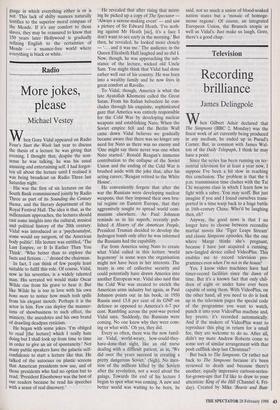Radio
More jokes, please
Michael Vestey
When Gore Vidal appeared on Radio Four's Start the Week last year to discuss the thesis of a lecture he was giving that evening, I thought that, despite the non- sense he was talking, he was his usual amusing and entertaining self. I had forgot- ten all about the lecture until I realised it was being broadcast on Radio Three last Saturday night.
His was the first of six lectures on the South Bank commissioned jointly by Radio Three as part of its Sounding the Century theme, and the literary department of the Royal Festival Hall. The idea is that, as the millennium approaches, the lectures should cast some insights into the cultural, musical and political history of the 20th century. Vidal was introduced as a 'psychoanalyst, some would say surgeon, of the American body politic'. His lecture was entitled, 'The Last Empire, or It Is Earlier Than You Think'. 'Who better than to explore the facts and fictions ...' droned the chairman.
In fact, I can think of few people least suitable to fulfil this role. Of course, Vidal, now in his seventies, is a widely talented man. His serrated wit would make Oscar Wilde rise from his grave to hear it. But like Wilde he is too in love with his own bons mots to notice how much tosh spills from his elegant mouth. Perhaps it is the actor in him. Few can deploy the manner- isms of showbusiness to such effect, the mimicry, the anecdotes and his own brand of drawling deadpan cynicism.
He began with some jokes. 'I'm obliged to read [the lecture] which I really hate doing but I shall look up from time to time in order to give an air of spontaneity.' Not many public speakers have the galactic self- confidence to start a lecture like that. He talked of the autocues on plastic screens that American presidents now use, and of those presidents who had no option but to read, 'President Eisenhower was the best of our readers because he read his speeches with a sense of real discovery.' He revealed that after rising that morn- ing he picked up a copy of The Spectator 'Always a serene-making event' — and saw a picture of Sir Edward Heath. 'I've noth- ing against Mr Heath [sic], it's a face I don't want to see early in the morning.' But then, he revealed, he looked more closely — and it was me.' The audience in the Queen Elizabeth Hall laughed and so did I. Now, though, he was approaching the sub- stance of the lecture, wicked old Uncle Sam. You might think that Vidal had done rather well out of his country. He was born into a wealthy family and he now lives in great comfort at Ravello.
To Vidal, though, America is what the late Ayatollah Khomeini called the Great Satan. From his Italian belvedere he con- cludes through his exquisite, sophisticated gaze that America was entirely responsible for the Cold War by developing nuclear weapons and establishing Nato. When the Soviet empire fell and the Berlin Wall came down Vidal believes we gradually became aware that there was no longer any need for Nato as there was no enemy and `One might say there never was one when Nato started.' Ronald Reagan's immense contribution to the collapse of the Soviet Union and the ending of the Cold War is brushed aside with the joke that, after his acting career, 'Reagan retired to the White House'.
He conveniently forgets that after the war the Russians were developing nuclear weapons, that they imposed their own bru- tal regime on Eastern Europe, that they aggressively sought to spread world com- munism elsewhere. As Paul Johnson reminds us in his superb, recently pub- lished A History of the American People, President Truman decided to develop the hydrogen bomb only after he was informed the Russians had the capability.
Far from America using Nato to create what Vidal called in this lecture 'world hegemony' in some ways the organisation might not have been in her interests. The treaty is one of collective security and could potentially have drawn America into another European war. Vidal also said that the Cold War was created to enrich the American arms industry but again, as Paul Johnson points out in his book, in 1950 Russia used 13.8 per cent of its GNP on defence as opposed to America's 6-7 per cent. Rambling across the post-war period Vidal says, 'Suddenly, the Russians were coming. No one knew why they were com- ing or what with.' Oh yes, they did.
Every so often, there was the now famil- iar Vidal, world-weary, how-could-they- have-done-that sight, like an old nurse dealing with a difficult patient, as in, 'We did over the years succeed in creating a pretty dangerous Soviet.' (Sigh). No men- tion of the millions killed by the Soviets after the revolution, not a word about the gulags. Towards the end of his lecture I began to spot what was coming. A new and better world was waiting to be born, he said, not so much a union of blood-soaked nation states but a 'mosaic of homoge- neous regions'. Of course, an integrated European Union, the Brussels utopia as well as Vidal's. Just make us laugh, Gore, there's a good chap.


























































 Previous page
Previous page